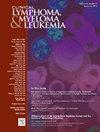SOHO最新进展和下一个问题|CAR T细胞疗法和双特异性抗体在套细胞淋巴瘤中的应用现状。
IF 2.7
4区 医学
Q2 HEMATOLOGY
引用次数: 0
摘要
MCL仍无法治愈,服用BTK抑制剂后复发的患者疗效不佳。BsAbs和CAR T细胞疗法是治疗R/R MCL患者的新策略。这些疗法在以往令人沮丧的领域中表现出良好的疗效和副作用。本综述将详细介绍BsAbs和CAR T细胞疗法治疗R/R MCL的现有数据,以及目前的治疗模式如何转变以纳入这些新型药物。本文章由计算机程序翻译,如有差异,请以英文原文为准。
SOHO State of the Art Updates and Next Questions | The Current State of CAR T-Cell Therapy and Bispecific Antibodies in Mantle Cell Lymphoma.
MCL remains incurable, and patients who relapse post BTK inhibitors have poor outcomes. BsAbs and CAR T cell therapy are novel strategies to treat patients with R/R MCL. These therapies exhibit favorable outcomes and side effect profiles in a previously dismal space. This review looks to detail the current data available for BsAbs and CAR T cell therapy in R/R MCL, and how are current treatment paradigm is shifting to incorporate these novel agents.
求助全文
通过发布文献求助,成功后即可免费获取论文全文。
去求助
来源期刊

Clinical Lymphoma, Myeloma & Leukemia
ONCOLOGY-HEMATOLOGY
CiteScore
2.70
自引率
3.70%
发文量
1606
审稿时长
26 days
期刊介绍:
Clinical Lymphoma, Myeloma & Leukemia is a peer-reviewed monthly journal that publishes original articles describing various aspects of clinical and translational research of lymphoma, myeloma and leukemia. Clinical Lymphoma, Myeloma & Leukemia is devoted to articles on detection, diagnosis, prevention, and treatment of lymphoma, myeloma, leukemia and related disorders including macroglobulinemia, amyloidosis, and plasma-cell dyscrasias. The main emphasis is on recent scientific developments in all areas related to lymphoma, myeloma and leukemia. Specific areas of interest include clinical research and mechanistic approaches; drug sensitivity and resistance; gene and antisense therapy; pathology, markers, and prognostic indicators; chemoprevention strategies; multimodality therapy; and integration of various approaches.
 求助内容:
求助内容: 应助结果提醒方式:
应助结果提醒方式:


